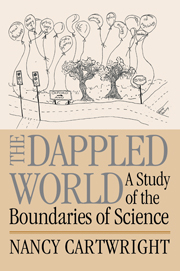Book contents
- Frontmatter
- Contents
- Acknowledgements
- Introduction
- Part I Where do laws of nature come from?
- 1 Fundamentalism versus the patchwork of laws
- 2 Fables and models
- 3 Nomological machines and the laws they produce
- Part II Laws and theier limits
- Part III The boundaries of quantum and classical physics and the territories they share
- Bibliography
- Index
3 - Nomological machines and the laws they produce
Published online by Cambridge University Press: 05 June 2012
- Frontmatter
- Contents
- Acknowledgements
- Introduction
- Part I Where do laws of nature come from?
- 1 Fundamentalism versus the patchwork of laws
- 2 Fables and models
- 3 Nomological machines and the laws they produce
- Part II Laws and theier limits
- Part III The boundaries of quantum and classical physics and the territories they share
- Bibliography
- Index
Summary
Where do laws of nature come from?
Where do laws of nature come from? This will seem a queer question to a post-logical-positivist empiricist. Laws of nature are basic. Other things come from, happen on account of, them. I follow Rom Harré in rejecting this story. It is capacities that are basic, and laws of nature obtain – to the extent that they do obtain – on account of the capacities; or more explicitly, on account of the repeated operation of a system of components with stable capacities in particularly fortunate circumstances. Sometimes the arrangement of the components and the setting are appropriate for a law to occur naturally, as in the planetary system; more often they are engineered by us, as in a laboratory experiment. But in any case, it takes what I call a nomological machine to get a law of nature.
Here, by law of nature I mean what has been generally meant by ‘law’ in the liberalised Humean empiricism of most post-logical-positivist philosophy of science: a law of nature is a necessary regular association between properties antecedently regarded as OK. The association may be either 100 per cent – in which case the law is deterministic, or, as in quantum mechanics, only probabilistic. Empiricists differ about what properties they take to be OK; the usual favourites are sensible properties, measurable properties and occurrent properties. My objections do not depend on which choice is made.
- Type
- Chapter
- Information
- The Dappled WorldA Study of the Boundaries of Science, pp. 49 - 74Publisher: Cambridge University PressPrint publication year: 1999



